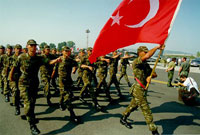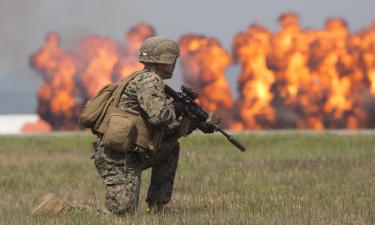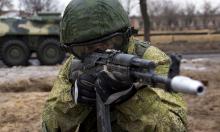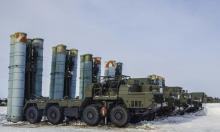Turkish troops cross northern Iraqi border
Turkish troops crossed Iraqi border and went about three kilometers (1.5 miles) into northern Iraq.

The troops crossed into an area near the border with Iran, about 120 kilometers north of the city of Irbil, Jabar Yawar, a spokesman for Kurdistan's Peshmerga security forces, told the AP.
About 300 Turkish troops crossed the border at 3 a.m. (0000GMT), said Jamal Abdullah, a spokesman for the regional Kurdistan government. He said the region was a deserted mountainous frontier area.
A Turkish government official, speaking in Ankara on condition of anonymity because he was not authorized to speak to the media, confirmed that around 300 Turkish soldiers penetrated into northern Iraq .
"They are still there," he said without elaborating.
The U.S. Embassy in Baghdad declined to comment on reports of the Turkish operation.
On Sunday, Turkey conducted airstrikes against rebels from the Kurdish Workers' Party, or PKK, in northern Iraq. As many as 50 fighter jets were involved in the attack, the biggest against the PKK in years. The Iraqi parliament on Monday condemned the bombing, calling it an "outrageous" violation of Iraq 's sovereignty. Turkey said Sunday's attack used U.S. intelligence and was carried out with tacit American approval.
The PKK has battled for autonomy for southeastern Turkey for more than two decades and uses strongholds in northern Iraq for cross-border strikes.
To the south in Kirkuk, U.S. Secretary of State Condoleezza Rice made an unannounced visit to the city that Iraq's Kurds call their Jerusalem, an oil-rich territory claimed by many.
Rice was meeting members of a civilian-military reconstruction unit based in Kirkuk and provincial politicians. She was to meet Iraq's central leadership later in Baghdad .
Sunni Arabs ended a yearlong political boycott earlier this month in Kirkuk - the hub of Iraq's northern oil fields - under a deal that sets aside government posts for Arabs. It was the biggest step yet toward unity before a referendum on the area's future.
Kirkuk is an especially coveted city for both the Shiite-dominated Iraqi government in Baghdad and the Kurdish one in Irbil. Kurds want to incorporate it into their self-rule area, but the idea has met stiff resistance from Arabs and a constitutionally required referendum on the issue was delayed to next year.
Much of Iraq's vast oil wealth lies under the ground in the region, as well as in the Shiite-controlled south. Kurds control of the area's oil resources and its cultural attachment to Kurdistan have been hotly contested.
Washington is trying to balance support for two key allies: the Turkish government and the Iraqi Kurds. Despite their apparent support for a limited raid, the U.S. remains firmly opposed to any major Turkish military operation into northern Iraq - which could disrupt one of the calmest areas of Iraq and run the risk of destabilizing the entire region.
Subscribe to Pravda.Ru Telegram channel, Facebook, RSS!




